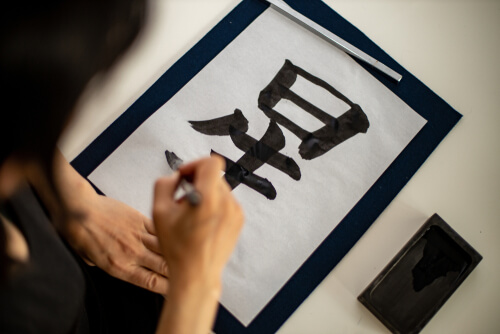The Japanese kanji for star is 星. Learn how to say star in Japanese. Read on to find out!
There are a number of Japanese kanji that can be used to represent the word "star". The most common kanji is 星 (sei), which is a pictograph that originally depicted a star with five points.
Another common kanji for "star" is 天体 (tentai), which literally means "celestial body". This kanji is often used in scientific contexts to refer to stars, planets, and other objects in space.
In this article, we will explore the different Japanese kanji for star, and discuss how they are used in Japanese.
We will also provide some examples of how these kanji can be used in Japanese sentences.
Japanese Kanji For Star Is 星 (Hoshi)
The Japanese kanji for "star" is 星, pronounced as "hoshi." Comprising of four strokes, this character is a blend of simplicity and artistic flair, reflecting the essence of a star itself.
The topmost stroke curves gracefully to the right, while the subsequent two strokes extend diagonally downward and to the right.
The final stroke is a horizontal line that completes the character's unique form.

- Related: What Is The Japanese Kanji For Sun?
Breaking Down the Components of the Kanji 星
The Japanese kanji characters are often composed of smaller elements, known as radicals, which contribute to the character's meaning and pronunciation. The kanji 星 ("hoshi"), meaning "star," is no exception.
Let's delve into the components that make up this elegant character:
-
亠 (Lid Radical): The uppermost part of the kanji 星 is the radical 亠, which is often referred to as the "lid" radical. It appears like a small horizontal line with two downward strokes extending from its ends.
In the kanji 星, the 亠 radical serves as a visual representation of the sky or space that encompasses the stars.
-
日 (Sun Radical): The second component of the kanji 星 is 日, which means "sun." It is composed of a single horizontal stroke, representing the sun's radiant rays.
In the context of the character for "star," the sun radical emphasizes the luminosity and brilliance associated with stars.
-
生 (Life Radical): The last component, 生, means "life" and is characterized by two diagonal strokes intersecting a vertical stroke.
While not directly related to the concept of stars, this radical adds an intriguing layer of meaning to the character 星.
It may symbolize the life and energy that stars emit, or it could be interpreted as a representation of the cosmic energy and vitality associated with the universe.
How to Say "Star" in Japanese?
In the Japanese language, the word for "star" is expressed as "hoshi" and is written using the kanji character 星.
While 星 is the most common and formal way to refer to a star, there are also other ways to say "star" in Japanese, each with its own nuances and contexts.
Let's explore some of these variations:
- 星 (ほし) - Hoshi: As mentioned earlier, this is the standard and most commonly used term for "star" in Japanese. It encompasses the celestial, symbolic, and cultural meanings associated with stars.
- スター - Sutā: Borrowed from English, this term is often used in modern contexts, such as in the entertainment industry when referring to celebrities or stars of a show. It is also used for star ratings and other related concepts.
- 星々 (ほしぼし) - Hoshiboshi: This variation adds a touch of poetic flair by repeating the character 星 to create a plural form, emphasizing the idea of multiple stars. It can evoke a sense of wonder and abundance when discussing the night sky.
- 斑点 (まだらてん) - Madaraten: This term literally translates to "spots" or "dots" and can be used to describe stars in a more literal sense, especially when referring to their appearance as tiny points of light in the night sky.
- 天体 (てんたい) - Tentai: While not a direct translation for "star," this term means "celestial body." It is a broader term that includes stars, planets, and other objects in space.
- 星座 (せいざ) - Seiza: This term refers to "constellation." While it doesn't directly mean "star," it's used to describe groups of stars that form patterns in the night sky. Each constellation has its own name and significance in various cultures.
Sentence Examples For 星
- 夜空にはたくさんの星が輝いています。
(Yozora ni wa takusan no hoshi ga kagayaiteimasu.)
Many stars are shining in the night sky.
- 彼女は星座に詳しいです。
(Kanojo wa seiza ni kuwashii desu.)
She is knowledgeable about constellations.
- この本は宇宙の星に関する情報がたくさん載っています。
(Kono hon wa uchū no hoshi ni kansuru jōhō ga takusan notteimasu.)
This book contains a lot of information about the stars in the universe.
- 彼の演技は本物のスターのようでした。
(Kare no engi wa honmono no sutā no yō deshita.)
His performance was like that of a true star.
- きれいな星々が輝く夜は私のお気に入りです。
(Kirei na hoshiboshi ga kagayaku yoru wa watashi no okiniiri desu.)
Nights, when beautiful stars are shining, are my favorite.
- 星の光は遠い過去のものを私たちに伝えてくれます。
(Hoshi no hikari wa tōi kako no mono o watashitachi ni tsutaete kuremasu.)
The light of the stars conveys things from the distant past to us.
- 彼は映画界で輝くスターとして名声を得ました。
(Kare wa eigakai de kagayaku sutā toshite meisei o emashita.)
He gained fame as a shining star in the film industry.
- 夜になると、星が空に現れます。
(Yoru ni naru to, hoshi ga sora ni arawaremasu.)
When night falls, stars appear in the sky.
- 星を見上げながら、私は小さな存在であることを感じました。
(Hoshi o miagenagara, watashi wa chiisana sonzai de aru koto o kanjimashita.)
While looking at the stars, I felt the insignificance of my existence.
- 彼はその映画で新しいスターとして輝きを見せました。
(Kare wa sono eiga de atarashii sutā toshite kagayaki o misemashita.)
He showed his brilliance as a new star in that movie.




